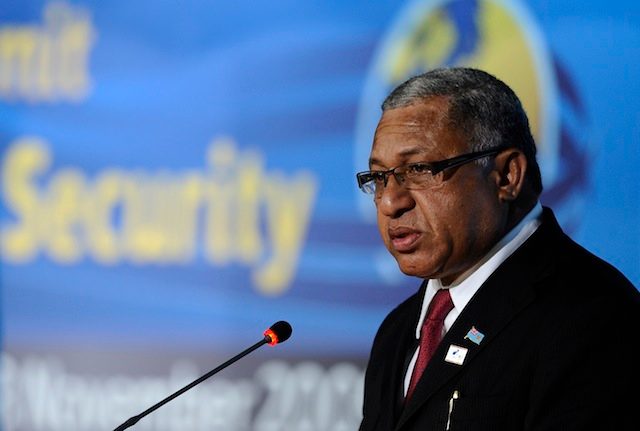SUMMARY
This is AI generated summarization, which may have errors. For context, always refer to the full article.

SUVA, Fiji – Fiji’s return to democracy will not disrupt a burgeoning relationship with China forged when Western democracies shunned the South Pacific nation in the wake of a 2006 military coup, experts say.
Signs of Beijing’s influence are everywhere in Fiji – Chinese-flagged trawlers queue for berths at Suva docks, aid projects such as a huge hospital being built outside the capital teem with imported labourers and the University of the South Pacific’s Confucius Institute works diligently to promote Chinese language and culture.
Australia and New Zealand were traditionally the island nation’s strongest allies but that began to change after military strongman Voreqe Bainimarama seized power in 2006, British thinktank the Overseas Development Institute (ODI) said.
Canberra and Wellington demanded an immediate return to democracy and set about isolating Fiji when Bainimarama refused, ODI researcher Maya Schmaljohann said.
Diplomatically, Fiji was suspended from the British Commonwealth and the Pacific Islands Forum, while multilateral lenders such as the World Bank and Asian Development Bank stopped providing funds to the government.
But Schmaljohann said the move backfired when Bainimarama adopted a new foreign policy entitled “Look North”, centred on engagement with China.
She said China was keen to increase its influence in the Pacific through aid and investment, creating strong ties with Bainimarama, who won by a landslide when Fiji held its first election since the 2006 coup on September 17.
“The traditional Western donors kind of turned away and made it possible for China to step in,” Schmaljohann, who has just co-authored an ODI report on Fiji’s aid sector, told AFP.
“Fiji and China established a really good relationship and I think that will carry on.
“It was a consequence that Australia and New Zealand didn’t really think about, they just wanted to push for democracy and completely forgot that China was there and was happy to step in.”
‘We’re competing with China’
Canberra and Wellington both viewed China’s influence in Fiji with growing frustration, while the-then US secretary of state Hillary Clinton made her displeasure known at a Senate committee hearing in 2011.
“We’re in competition with China… China is in there every day in every way trying to figure out how it’s going to come in behind us, come in under us,” she said, complaining about how Beijing had “wined and dined” Pacific island leaders.
Sydney-based foreign policy thinktank The Lowy Institute has estimated that from 2005-11 China handed out US$600 million in so-called “soft loans” to Pacific countries such as Tonga, Samoa and Fiji.
Fiji, with 900,000 people, is by far the most populous and economically powerful of the South Pacific island nations and seen as a regional hub for business and diplomacy.
The ODI report said Fiji liked Chinese loans because they typically did not come with any conditions, officials simply nominated a development project such as a bridge or hydro-electic station and money was provided to build it.
But it said Chinese loans had higher interest rates than those from Western development banks and Beijing also ensured labour and materials were imported from China, meaning there was little benefit to the local economy.
Schmaljohann said Western donors were set to re-engage with Fiji now that this month’s election had been deemed legitimate. Australia and New Zealand began dismantling sanctions before the poll was even held.
The British Commonwealth reinstate Fiji as a full member following the ‘credible elections’ earlier this month, eight years after the South Pacific nation was first suspended.
Schmaljohann warned, however, that China was in Fiji to stay, meaning Canberra could not expect a return to the pre-coup days when it regarded the South Pacific nation as part of its own backyard, out of bounds to other players.
“Australia has previously been a dominant partner in the Pacific but now it has to share the space with China,” she said. “I think the Australians are aware of this.”
Schmaljohann said the biggest winner was probably Fiji, which was set to field multiple offers of aid and cheap loans in the post-election environment.
“They’re now in a position to play them off and say ‘I now have all these possibilities, let’s see what you can offer and then I’ll make my choice’,” she said. – Rappler.com
Add a comment
How does this make you feel?
There are no comments yet. Add your comment to start the conversation.